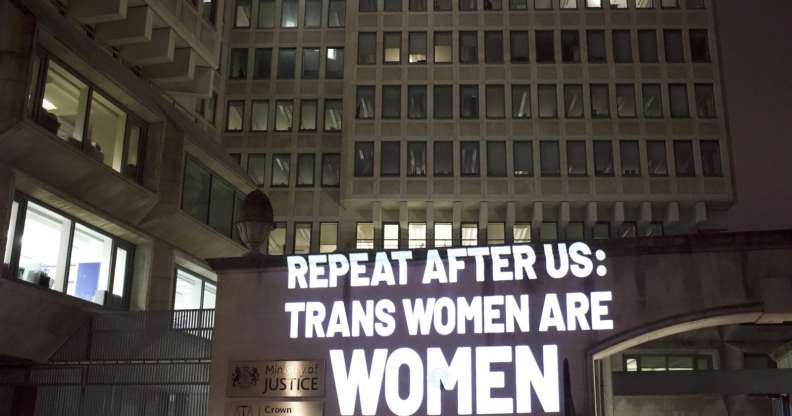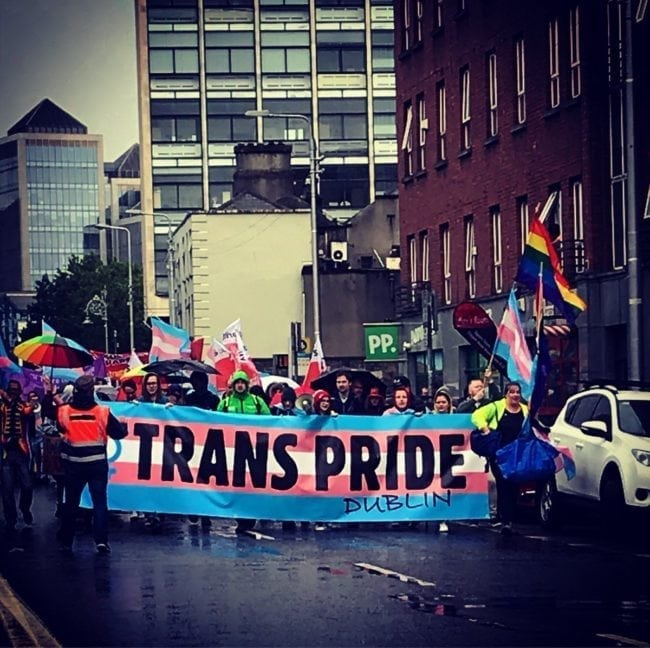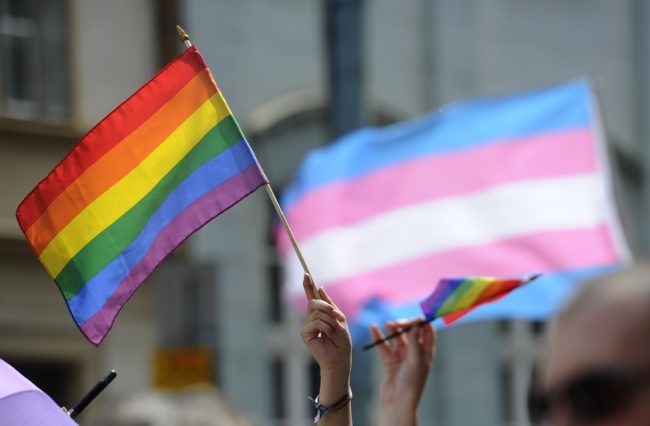The next frontier of LGBT equality? Reforming the Gender Recognition Act

‘Repeat after us: Trans Women are Women’ was projected onto the side of the Ministry of Justice (Courtesy Dazed)
'Repeat after us: Trans Women are Women' was projected onto the side of the Ministry of Justice (Courtesy Dazed)
“You can get married now, isn’t that all you wanted? I thought the struggle for LGBT equality was over?”
Over and over again, I get asked these kinds of questions. People trying to figure out what’s next after equal marriage.
While there’s still plenty of progress to be made for the whole community, for trans people in particular, there remains serious legal gaps that exist before we have full equality.
One area under review is the 2004 Gender Recognition Act (GRA). This is the law that enables some trans people to have their gender legally recognised with a Gender Recognition Certificate (GRC).
Being able to change the name and gender on their birth certificate makes it easier for trans people to get a new job, get married or change their records. While it was ground-breaking when first introduced, the act is now outdated and in urgent need of reform.
So when people ask those questions about what’s next, reform of the GRA is the answer they get.
This would be life-changing for so many trans people in Britain. Getting rid of a humiliating, dehumanising process to allow trans people to have their gender recognised by the state without being treated as having a mental illness would be a huge step forward towards equality.

Anti-trans fear-mongering
However, campaigning and lobbying to reform the GRA cannot solely fall on the shoulders of our trans siblings. You’ve probably seen online or in the news the hostility facing trans people at the moment. There are deeply misleading stories about young people being ‘turned trans’ and repeated arguments that being trans is a mental illness. For many cis lesbian, gay and bi people this should sound eerily familiar. It’s exactly how we were talked about in the 1980s.
Now we look back and think how absurd it was that anyone was ever allowed to claim that same-sex attraction was a mental illness or that talking about it was like ‘brainwashing’ kids into a new identity. The world didn’t end when people of the same sex could finally marry each other. It won’t end when trans people are able to be recognised for who they are.
What we’re seeing in the debate around the GRA is history repeating itself.
Trans people and their right to exist is being subject to a vicious public debate. So much so that now many people in the trans community, along with their family and friends, are scared to speak out for fear of backlash. It’s alarming to see such a vulnerable minority of the population being presented as such a major threat.
Trans people in Britain today face huge levels of abuse and inequality. Two in five people (41 percent) have had a hate crime committed against them in the past year, and nearly two in three trans students (64 per cent) are bullied for being trans in school.
Their fight is my fight. We owe a great deal of debt to our trans siblings for the progress we’ve made towards equality.
Next year, we’ll be commemorating 50 years since the Stonewall Riots. Riots that lasted for nights on end as LGBT people fought for their right to exist. It’s universally known as the beginning of the LGBT equality movement. The riots were also started by trans women of colour like Marsha P. Johnson and Sylvia Rivera, and a black butch lesbian, Stormé DeLarverie.

A transgender flag flies in the background during a Pride march (SAMUEL KUBANI/AFP/Getty)
Trans people started this movement and have lost a lot in the fight for LGBT rights.
Now that the government has opened its public consultation on the act, we have an extraordinary chance to have a say in how the law should be changed. Public pressure helped bring down Section 28 and usher in same-sex marriage. Our voices matters. For cis lesbian, gay and bi people it’s our turn to come together, stand with and fight for trans equality.
I’ve seen plenty of incredibly affirming messages of support online from people within the LGB community for trans people, but now it’s time to make that support even more visible and vocal. Being a trans ally is not just about saying the right things, it’s about being an active, engaged supporter to the community. Responding to the GRA consultation is a unique chance for us to take control and make a difference. These kind of opportunities are rare and it’s up to us to make the most of it.
Filling in the consultation is also really simple. Stonewall has created an easy-to-use version of the consultation firm to help.
If you’re not trans, changing the GRA will barely affect you. But, it will mean that you and the people you love are living in a fairer society. So it’s important you make your voice heard.
To those of you who believe in equality, please Come Out for Trans Equality. Be a fierce, active ally and respond to the government’s consultation. Together we will win this fight, like we have done so many times in the past.
Jeff Ingold is media manager at Stonewall UK.

